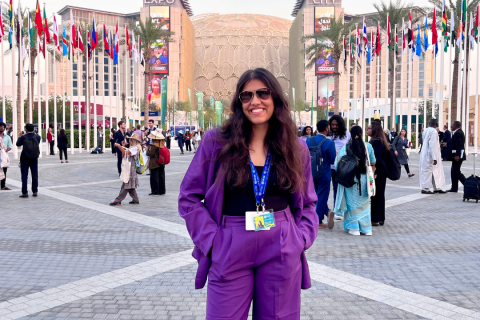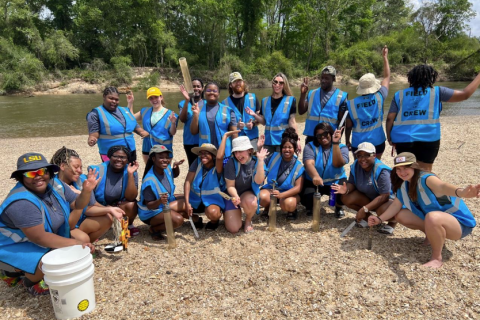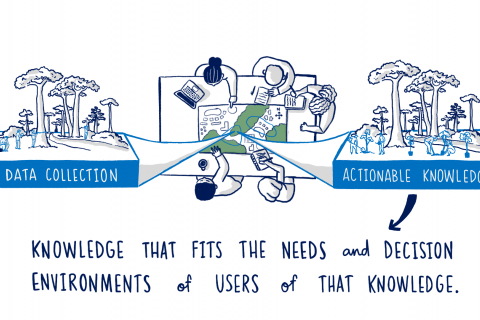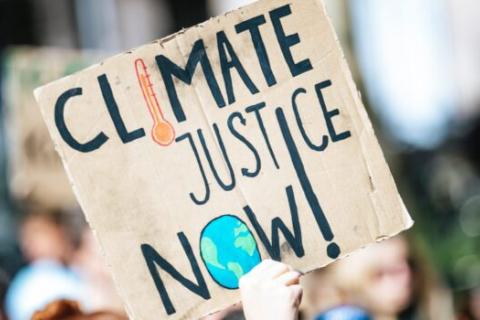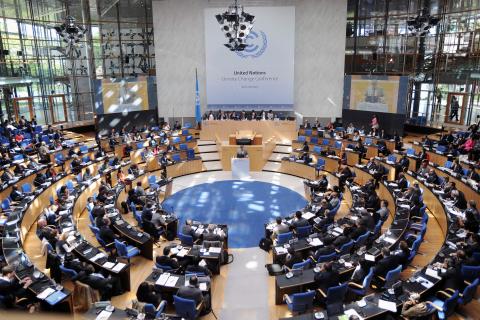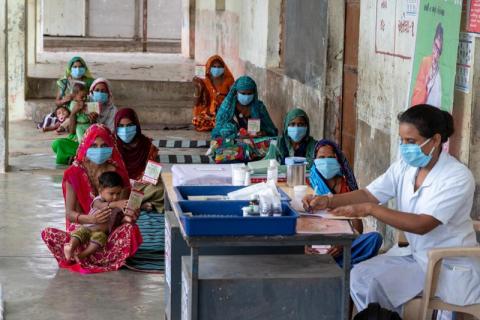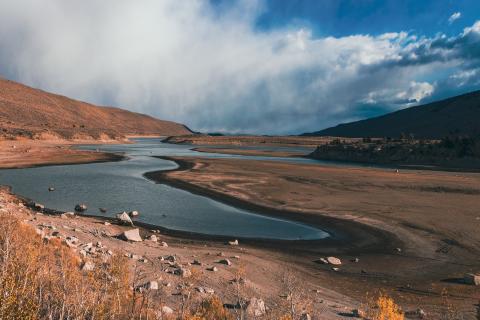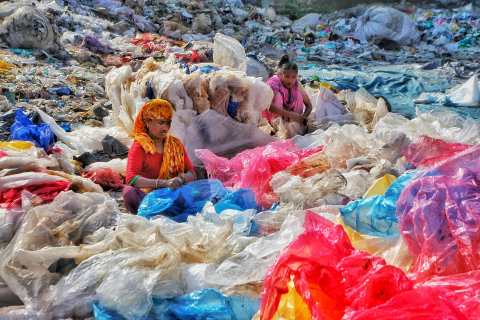* Essays offer an open forum to essays about science and the environment, and that they are the opinions of the writers but do not necessarily represent the views of GCSE.
GCSE Essays are authored by researchers, thinkers, and experts in GCSE's global network. GCSE Essays provide a deeper look into trending topics and new ideas across the environmental and scientific communities, with a particular focus on use of science to inform decision-making about complex environmental challenges.
Past essays have covered topics ranging from nature-based solutions, to health, to informative overviews of complex multilateral agreements. Essays are published on GCSE’s website and promoted in our monthly newsletter, The Connection, composed of approximately 20,000 scientists, educators, policymakers, business leaders, and officials at all levels of government across the globe. See submission form and guidelines here.
Reflecting on COP28 - Laalitya Acharya
January, 2024
In this essay, Laalitya Acharya, Founder of the Nereid Project and GCSE Delegate, reflects on her experience as a youth scientist and activist at COP28.
EnvironMentors: The Role of Place-Based Mentorship with the Next Generation of STEM Professionals
July, 2023
“Unless someone like you cares a whole awful lot, nothing is going to get better, it’s not.” - Dr. Seuss
Engaging With Heart: Key to Ensuring a Better Future for All
June, 2023
How can we ensure a better future for all? This question is at the core of so much of our work as environmental and sustainability professionals. I was recently asked to address this question to set the stage for an environmental studies and science conference for graduate students whose conference theme was Exploring the Margins: Environmental Research for a Better Future.
Building Resilience: Mending Nets and Cultivating Sustainable Futures
May, 2023
In our first GCSE essay last October, we presented a method for Reframing Sustainability Education to include the weaving of Indigenous knowledge systems and decolonizing higher education as a necessary and critically missing piece of our work and practice in sustainability.
Opening New Pathways for Societal Impact through Actionable Knowledge Production
April, 2023
Science should help inform solutions to the many urgent societal challenges we face, from climate change to sustainable development, to combating disease and improving public health, to creating sustainable and secure food, water, and energy systems, to stemming biodiversity loss, and much more.
Regenerate!
February, 2023
As a sustainability program director, Dr. Lee Ball feels a palpable tension between the urgency for aggressive climate action and the hope for a more sustainable future. For many individuals working in higher education, hope fuels their idealism in a world dominated with ROIs and VLRs and SDGs…and with competing priorities and fear. Lee details a field riddled with obstacles, yet required to provide reliable "real world" solutions. He provides a call to action for not just "sustaining the sustainers", but for learning to regenerate together.
Unpacking the UNEA Resolution to End Plastic Pollution
January, 2023
GCSE Senior Fellows Mary Ellen Ternes, Esq. and Jeffrey Seay, Ph.D. unpack UNEA Resolution 5/14 entitled “End plastic pollution: Towards an international legally binding instrument." The authors summarize key challenges with plastic, such as its often toxic nature and its disparate effects on developing nations. The essay also reviews results from the first Intergovernmental Negotiating Committee session (INC-1), GCSE’s involvement with INC-1, and GCSE’s contributions to critical scientific consensus on plastic pollution.
Climate Justice, Societal Transformation and the Role of Higher Education
November, 2022
The science is clear. To reduce human suffering from the climate crisis, humanity must implement a coordinated global plan to phase out fossil fuels. Exploration of new fossil fuels must end, extraction of existing fossil fuel resources must be rapidly scaled back, and new transformative public investments are needed. Despite the scientific clarity of this basic, practical need for climate justice, powerful corporate interests continue to exert their influence to resist change. Unfortunately these corporate interests have also been wielding their powe
Walking the Talk: A Post-pandemic Campus-Community Action Agenda for Sustainability and Resiliency Education
October, 2022
Sustainability in Higher Education stands at a crossroads: do we return to the way things were….or do something different? Covid forced communities to reflect on their ability to respond to disasters and has shed light on how to create more resilient social systems. How do we echo this restructuring and “build back better” for Sustainability in Higher Education?
The Influence of United States Leadership on Multilateral Climate Decision-Making Processes
September, 2022
Climate change impacts are visibly worsening around the globe and implementing mitigation and adaptation strategies requires unprecedented international cooperation. Historically, decision-makers have worked together to address climate change through multilateral and international treaties that have domestic policy implications for the signatories.
Land and Water Management in the Ethiopian Highlands to Protect Ecosystem Services
July, 2022
As high-income countries around the world increase environmental protections, ecosystem services are deteriorating where most needed - people in low- and middle-income countries rely heavily on ecosystem services. In Africa, human activity is changing water use, as land is put under cultivation and dams developed for energy and irrigation. Most often, ecosystem health is ignored in the course of development.
Mitigating Health Impacts from Climate Change through Managed Retreat
June, 2022
There is no denying that climate change is one of the most potent drivers of human migration. The World Bank’s latest report projects that 216 million people across six world regions will move within their countries by 2050 (Clement et al., 2021).
A Perfect Storm: Climate Change, Biodiversity Loss, Global Water Scarcity
May, 2022
Almost all environmental and economic indicators projecting our world’s future show that we are headed towards a perfect storm by mid-century. This bleak outlook is the result of increasing global impacts of climate change, the distinct probability of a massive extinction of species, and a world without adequate freshwater resources to sustain life.
Saving Nature with Nature
April, 2022
Ecosystem services are the gifts from nature that keep on giving. Coupled with the mobilization of global actions at scale, the combination can disrupt the current destabilization of the Earth’s climate system. This level of unprecedented actions is imperative to curb the staggering loss of biodiversity and to determine pathways to recover and restore what’s already been lost.
Protecting the Biosphere: Science Diplomacy in Action to Combat Plastic Pollution
March, 2022
Demonstrating that global consensus is achievable most especially when science is engaged in the process, 175 nations agreed to determine a legally-enforcing treaty to manage plastic pollution to enter into force by 2026. Likened to the Montreal Protocol as a swift effort by nations in science diplomacy, the End Plastic Pollution resolution requires concrete global action to mitigate plastic pollution by nations.
